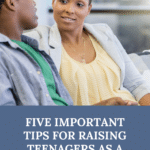
I have always been struck by the enormity of parenting.
It can be by far the most rewarding role we fulfill. At the same time, it is characterized by a continual demand on our emotions, our time, and our mental capacity.
This is never truer than when you are parenting teenagers alone.
Related: Parenting Teens Is The Most Exhausted I’ve Ever Been
It is hard to understand the demand of single parenting during the teenage years.
I remember the day I was walking my dog, and the enormity of it hit me like a ton of bricks.
I had been a single mom with full custody for about eight months when I literally stopped in my tracks at the realization of how alone I felt with such a great responsibility.
During those eight months, I was so focused on meeting the responsibilities that I didn’t notice its toll on me.
I felt anxious and overwhelmed to the point that I couldn’t hold it back.
I sat on the side of the road with my dog and sobbed.
It was time to acknowledge that even though I was doing it, and even though my teens seemed to be relatively happy, I was drained.
It may sound obvious, but it was one of the most validating conversations I have had with myself! Others had been telling me I was doing a great job, but I needed to acknowledge to myself the depth of the responsibility I felt.
Related: Three Simple Reasons Why Moms Need To Take Care of Themselves When Raising Their Teens
In my psychology practice, I am often asked for advice on parenting teens as a single parent. I have also taught many people the skill of self-validation
According to Psychology Today, self-validation is the act of accepting our own internal experience, including our thoughts and feelings. Self-validation can include acknowledging our challenges, prioritizing our own needs, giving ourselves grace, and/or accepting our limitations or mistakes.
Through my own experience as a single parent, I now tell clients (and myself) repeatedly about self-validation as my number one tool for managing this role.
Of course, self-validation does not change the difficulty of single parenting, so here are a few more tips for navigating single parenting during the challenging teenage years.
Five tips for single parenting during the teenage years
Let go of the guilt.
It is not effective for you or your kids. Mom guilt is real and single-mom guilt can be exponential.
As single moms, we believe we need to function as two parents and that simply isn’t possible. We feel guilty for not having as much time and energy as a two-parent household.
The good news is that our teens’ needs are better served if we think of quality over quantity.
Devote your limited time to being truly present with your teens. They don’t need us always to be available, but they do need to know that they have our undivided attention when we are.
Focusing on guilt only depletes your ability to provide attention when they need it. Instead, identify when you can be physically and mentally available and communicate that to your teens. They can be more understanding than you think.
Guilt also tends to lead to ineffective parenting decisions. It is often a motive for over-indulging our teens with material things and “going easy” on them when they don’t do what they are supposed to be doing.
I am not suggesting you need to be strict or inflexible, but you need to stay true to your rules and your values. Letting them “get away” with wandering too far from these will only have negative consequences.
Seek decision-making support from trusted people in your life.
When you feel like you are in it alone to make decisions regarding parenting, especially during these roller coaster teenage years, the anxiety can be crippling.
It is a lot of pressure on one person.
It is helpful to seek perspective from others. In my clinical practice, I have a consultation team. I trust my colleagues to help me be the most effective therapist possible.
I now also have a mom consultation team. They help me weigh the pros and cons of different approaches when it comes to helping my teens navigate their lives. They also help me avoid decisions that are overly informed by my emotions.
As a single parent, depending on a few people for emotional support also allows us to seek support from the “right” people. This is critical in helping us with the next point.
Do not allow your teens to step into the role of spouse.
Because single parenting can be so lonely, many people accidentally start filling their emotional needs with their teens.
Nothing is wrong with our teenagers knowing we are having a rough time. Yet, we need to make sure they don’t start to feel responsible for solving our stress or our loneliness.
Though many teenagers can start to feel like adults that we can vent to, they do not have the brain development or emotional resources of an adult–no matter how mature we think they are.
Allowing them to feel responsible for your emotional needs will leave them overwhelmed and anxious. Turn to your consultation team instead (or a professional mental health therapist.)
The anxious and overwhelmed states of most teens drive my fourth recommendation.
To the best of your ability, maintain stable rules and expectations.
All teenagers need this. They need it even more when adapting to a single-parent household or joint custody situations.
Adjusting to a single parent is a big transition for teens who are at a time in their life when there are so many transitions already.
As much as they seek more independence, they need the safety of predictable rules and expectations to keep them from feeling out of control of themselves (and you).
Even when it’s hard, support a good relationship between your teens and their other parent when possible.
Even amicable divorces can leave us feeling hurt and angry. We may see only the negative qualities the other parent brings to the table.
Expressing these feelings to your friends and family is okay, but not your children—even when it means your teens may not understand your point of view.
Maintaining a relationship with your ex may not be in your best interest, but it is in your children’s best interest.
Approach a co-parenting relationship separately from your past relationship and keep an eye on the primary goal of helping your teens. Good co-parenting relationships foster a sense of security and emotional well-being for your teens.
Single parenting teenagers is hard but possible.
As you consider these tips, I hope you continue returning to self-validation.
These are not easy tasks; acknowledging that and being gentle with yourself is helpful. I have no doubt you are doing the best you can and that working towards these suggestions will help you do even better.
This is a contributed post by Alisa Crossfield of Psychdiary.
Do you want a better relationship with your teen?
Are you in the thick of raising your tweens and teens? You may like this book by Whitney Fleming, the co-owner of Parenting Teens & Tweens: Loving Hard When They’re Hard to Love: Essays about Raising Teens in Today’s Complex, Chaotic World.

Parenting teens and tweens is hard, but you don’t have to do it alone.
Here are some other post parents found useful:
This Simple Analogy Can Help When Your Teen Doesn’t Feel “Good Enough”
Why We Need To Be Talking To Our Teens About Self Harm
Are Your Teenagers Procrastinators? 4 Ways To Help.
How To Better Support Your Teens When They’re Upset
*This post may contain affiliate links where we earn a small commission for items purchased from our site.






My relationship happened to take a sad turn as my husband resulted to womanizing, and this broke me down so I decided to look for a way to restore my once happy relationship back and I came across Dr Eze Odogwu and i give a try within 24hours of his work my husband came back begging and asking for forgiveness, Dr Eze Odogwu is also specialized on, Court cases & Weight lost, message Dr. Eze Odogwu here;
https://www.facebook.com/profile.php?id=61560368581969&mibextid=ZbWKwL